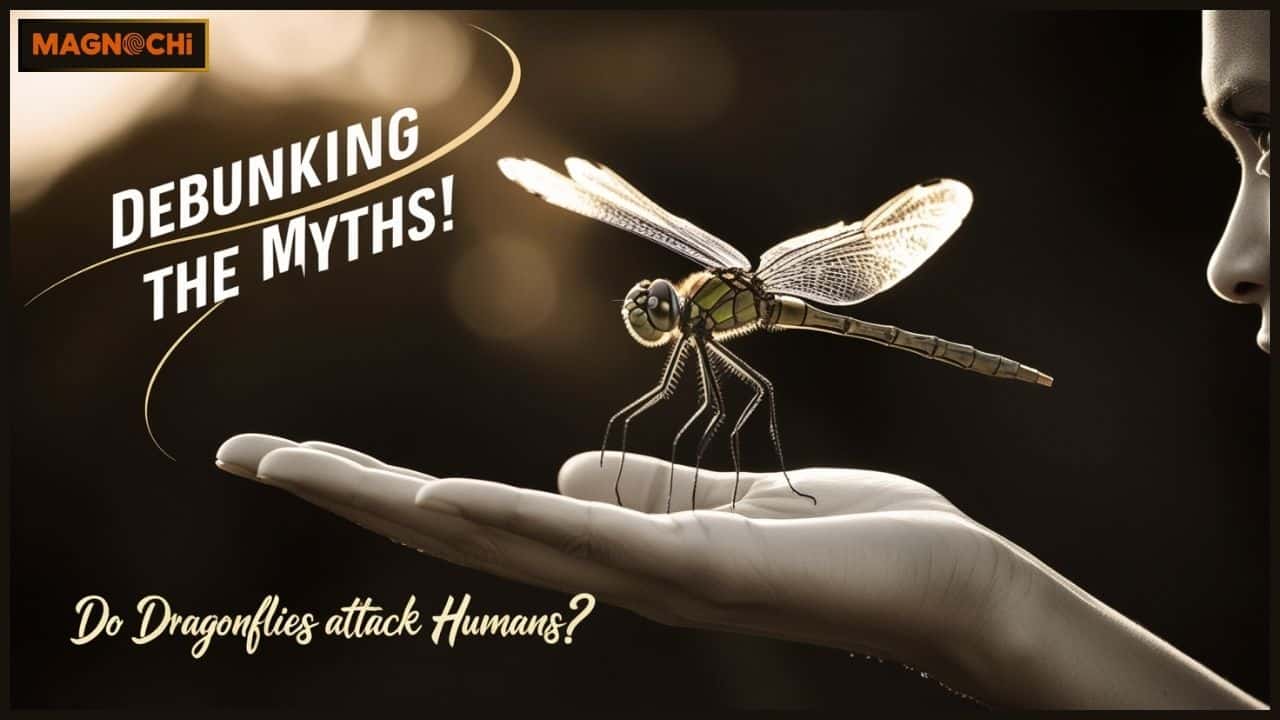Do Dragonflies Attack Humans? Dragonflies have fascinated humans for centuries. Their graceful flight patterns, vibrant colors, and impressive hunting skills make them a remarkable insect to observe.
But there’s one question that continues to intrigue many: Do dragonflies attack humans? While these creatures are undoubtedly captivating, they’ve also gained a reputation for being somewhat mysterious and even dangerous. In reality, most of the fear surrounding dragonflies is based on myths, misconceptions, and folklore.
This article aims to debunk those myths and provide a comprehensive understanding of dragonflies’ interactions with humans. We’ll explore the facts about their behavior, their roles in the ecosystem, and how you can interact with them safely.
So, let’s dive into the world of dragonflies, clearing up the myths once and for all!
What Are Dragonflies?
Before answering the main question, it’s essential to understand the basics of what dragonflies are. These insects belong to the order Odonata, which includes both dragonflies and damselflies. However, the focus of this article will be primarily on dragonflies and their role in nature and society.
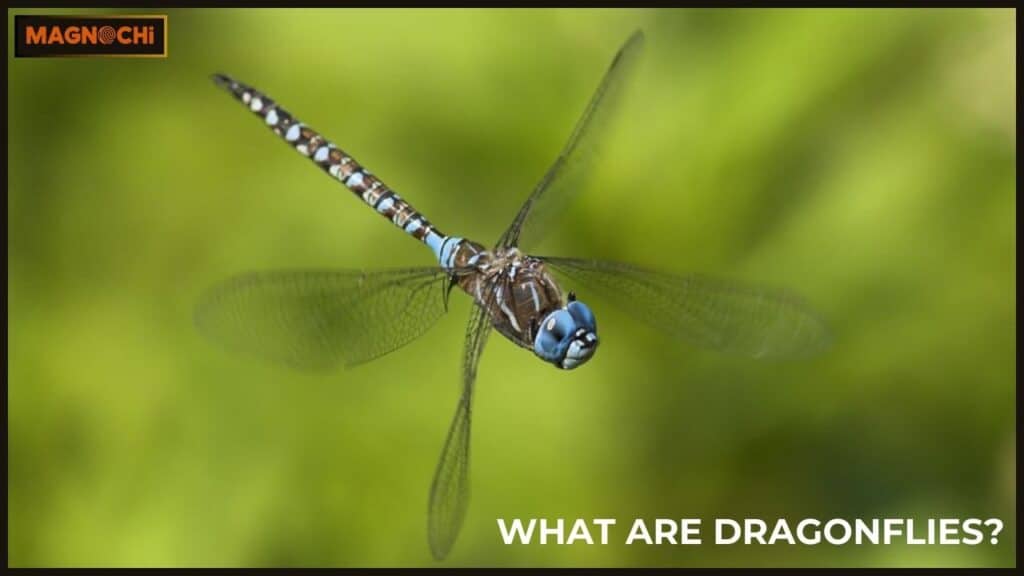
The Evolutionary History of Dragonflies
Dragonflies have a long evolutionary history, with the oldest known fossils dating back over 300 million years, well before the age of dinosaurs.
These ancient dragonflies were even larger than modern-day species, with some boasting wingspans up to 30 inches (76 cm), making them far more intimidating than the ones we see today.
Over the centuries, dragonflies have adapted to a variety of environments, but their role as predators has remained largely unchanged. [Do Dragonflies Attack Humans?]
The Life Cycle of a Dragonfly
Dragonflies undergo complete metamorphosis, meaning their life cycle consists of several distinct stages:
- Egg Stage: Dragonflies lay their eggs in or near water, often in calm ponds, marshes, or lakes.
- Nymph Stage: The eggs hatch into nymphs, which are aquatic larvae. These nymphs can spend up to 4 years living underwater, where they grow and develop.
- Emergence: After molting several times, the nymphs emerge from the water and transform into adult dragonflies.
- Adult Stage: The adult dragonfly is capable of flight, hunts for food, and eventually reproduces.
The Predatory Nature of Dragonflies
Dragonflies are aerial predators, and they are fierce hunters when it comes to capturing their prey. Their diet mainly consists of small insects, such as mosquitoes, flies, moths, and midges.
Their mandibles, strong mouthparts, enable them to seize and hold onto their prey mid-flight. A single dragonfly can consume hundreds of mosquitoes in a day, making them valuable allies in pest control.
Do Dragonflies Attack Humans?
Now that we have a solid understanding of what dragonflies are and how they live, it’s time to address the burning question: Do dragonflies attack humans?
The answer is a resounding no. Dragonflies are harmless to humans. While these insects may appear intimidating due to their large size, agile flight patterns, and sharp mandibles, they pose no danger to people.
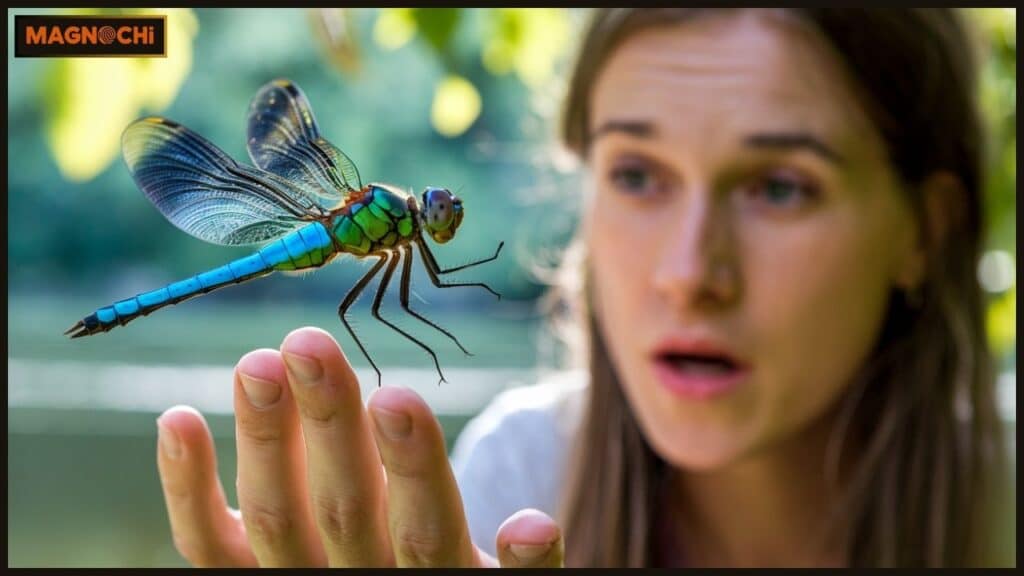
Dragonflies are not equipped to attack humans and have no reason to do so. Let’s take a closer look at why this misconception exists.
Myth vs. Reality: Understanding the Fear of Dragonflies
Dragonflies often get a bad rap, primarily because of their appearance and misunderstood behavior. Here’s a deeper look at why some people think dragonflies may be dangerous:
- Size and Appearance: Some dragonfly species, such as the Giant Darner, have large wingspans and can look quite imposing. With their iridescent bodies and fast, direct flight patterns, they can cause a moment of panic when they approach a person. However, despite their large size and striking appearance, dragonflies are not interested in humans as prey or threats.
- Flying Close to Humans: Dragonflies are curious creatures, and they are likely to fly near people, especially if they’re hunting for insects or simply navigating through their environment. If a dragonfly flies close to you, it’s not because it’s trying to attack, but because it’s pursuing prey or exploring its surroundings.
- Mandibles: Dragonflies have sharp mandibles that they use to capture and consume their prey. However, these mandibles are not designed for biting humans. While it’s theoretically possible for a dragonfly to bite if it feels threatened, such an occurrence is extremely rare and harmless.
- Folklore and Myths: In various cultures, dragonflies are surrounded by myths and superstitions. For example, in European folklore, dragonflies were sometimes referred to as “horse stingers,” and were believed to sting horses or even humans. This belief likely stems from their fast, darting flight and sharp features, but there is no evidence to support the idea that dragonflies are capable of stinging.
Can Dragonflies Bite?
While dragonflies do have mandibles capable of biting, they are not inclined to bite humans. In fact, their mandibles are used primarily for capturing and holding onto small prey, not for self-defense. [Do Dragonflies Attack Humans?]
If a dragonfly were to bite, it would likely be a defense mechanism if the insect felt threatened, but the bite would not be harmful. Dragonfly bites are not venomous, and they do not cause any long-term injury.
Do Dragonflies Sting?
It’s important to note that dragonflies cannot sting. While they may appear similar to wasps or other stinging insects due to their large, powerful wings and sharp features, dragonflies lack the specialized stinging organs. They are simply non-threatening insects that rely on their speed, agility, and predatory skills to survive.
Why Do People Think Dragonflies Attack Humans?
The myth that dragonflies attack humans likely arises from a combination of factors:
- Misunderstanding of Their Behavior: Dragonflies are highly agile and their fast flight can give the impression that they’re in “attack mode” when, in reality, they are just navigating or hunting.
- Cultural Myths and Folklore: In different parts of the world, dragonflies have been tied to various myths. In Japan, they are seen as symbols of strength and courage, while in some parts of Europe, they are seen as omens of misfortune. These myths have contributed to the fear or misunderstanding of dragonflies.
- The Appearance of Their Mandibles: Dragonflies’ mandibles might look dangerous at first glance, but they are used exclusively for catching prey and are not capable of delivering a harmful bite to humans.
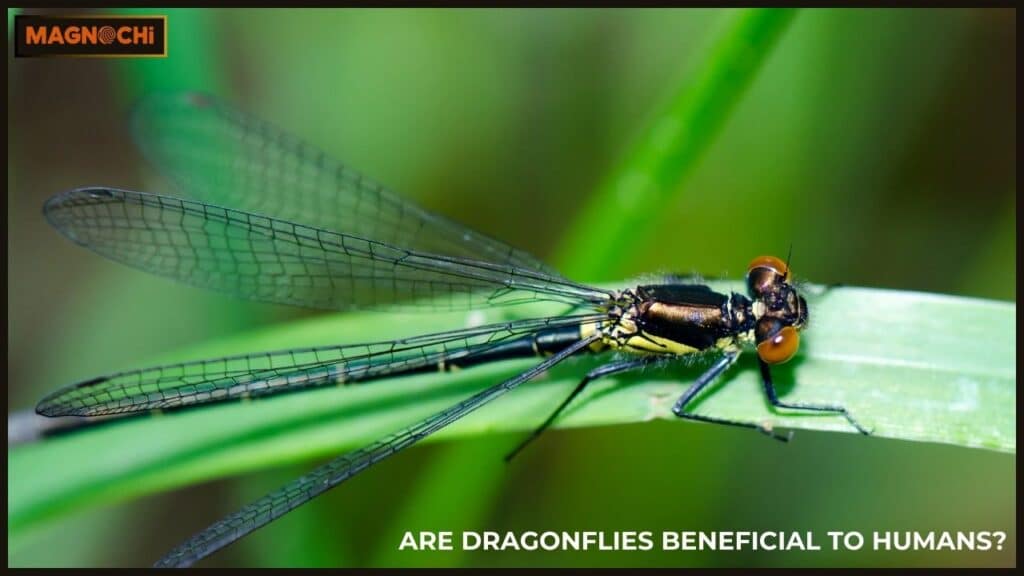
Are Dragonflies Beneficial to Humans?
While dragonflies are not harmful to humans, they offer numerous benefits to both the environment and us. Their role in maintaining ecological balance is invaluable. Let’s explore why dragonflies are beneficial to humans.
Role in the Ecosystem
Dragonflies are crucial players in maintaining a healthy and balanced ecosystem. As predatory insects, they control the populations of mosquitoes and other small insects, many of which can be pests or disease vectors. [Do Dragonflies Attack Humans?]
In fact, dragonflies are often considered natural pest controllers, and their presence can significantly reduce the need for harmful chemical pesticides.
Benefits of Dragonflies to Ecosystems:
- Pest Control: Dragonflies help keep the populations of mosquitoes, flies, and other pests in check, thereby reducing the risk of insect-borne diseases like malaria and dengue.
- Indicators of Environmental Health: The presence of dragonflies in a water body often signifies that the area is clean and free from pollutants. Because dragonfly nymphs live in the water for years, their health is directly tied to the condition of the water, making them important indicators of water quality.
- Maintaining Biodiversity: By controlling pest populations, dragonflies contribute to the overall biodiversity of their habitats. They help create a balanced environment where other species can thrive.
Dragonflies and Gardens
Dragonflies can be a valuable asset to gardeners. If you want to encourage them to visit your garden, creating a suitable environment is key. Here are a few ways to attract dragonflies to your garden:
- Install a Pond or Water Feature: Dragonflies need water to breed. Adding a small pond or water feature to your garden will create the perfect habitat for them.
- Plant Native Vegetation: Native plants provide shelter and food for dragonflies and their prey.
- Reduce the Use of Pesticides: Dragonflies are natural predators of mosquitoes and other pests. By minimizing the use of chemical pesticides, you’ll encourage more dragonflies to visit.
Benefits to Gardens:
- Natural Pest Control: Dragonflies will help keep your garden free from mosquitoes and other harmful insects.
- Pollination: While dragonflies primarily feed on other insects, their movements can help with the pollination of plants, benefiting your garden’s overall health.
- Aesthetic Value: Dragonflies add beauty to your garden with their vibrant colors and graceful flight. They’re also fun to watch and can be an educational addition to your outdoor space.
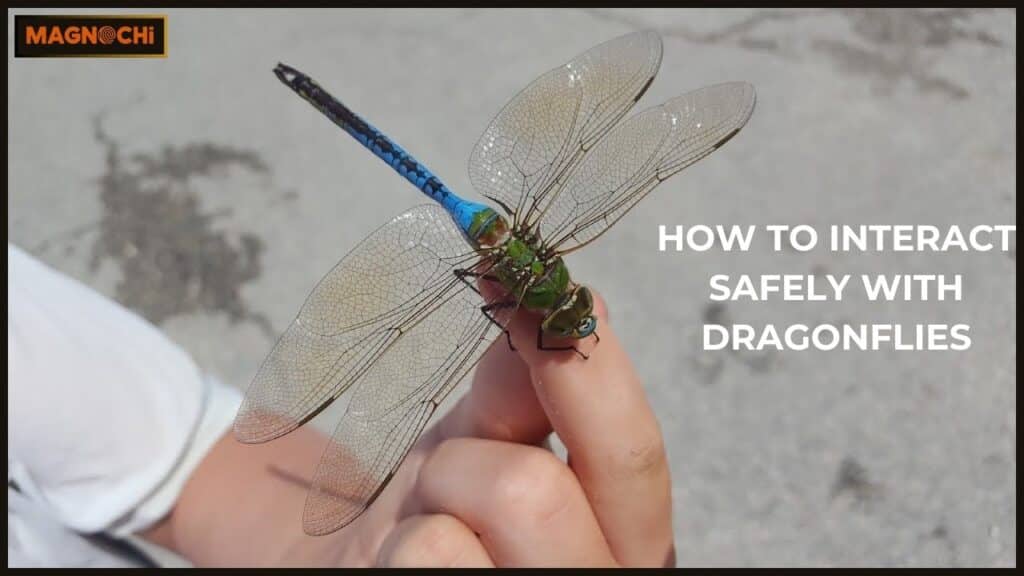
How to Interact Safely with Dragonflies
Even though dragonflies are harmless to humans, it’s essential to interact with them in a way that doesn’t harm them or disturb their natural behavior. Here are some tips on how to observe dragonflies safely and respectfully:
- Use Binoculars or a Camera: If you want to observe dragonflies up close, use binoculars or a camera to get a better view without disturbing them.
- Stay Still: If a dragonfly flies near you, try to stay still and calm. This will allow it to fly away without feeling threatened.
- Avoid Touching: While dragonflies are not dangerous, handling them can stress them out and potentially harm their delicate wings. It’s best to observe them from a distance.
What to Do If a Dragonfly Approaches
If a dragonfly approaches you, don’t panic! Dragonflies are just curious creatures or are likely on the hunt for food. They’re not there to harm you. Here’s what you can do:
- Stay still: If a dragonfly flies near you, remain calm and still. It will likely fly away once it’s satisfied with its observation.
- Let it pass: If a dragonfly lands nearby, simply observe it from a distance. Dragonflies do not view humans as threats, so there’s no need to worry.
Final Verdict: Do Dragonflies Attack Humans?
Dragonflies do not attack humans. These fascinating insects are harmless and have no interest in harming people. They are non-aggressive, aerial predators that play an essential role in pest control and maintaining healthy ecosystems.
Their remarkable flight patterns, vibrant colors, and graceful presence should be appreciated rather than feared. [Do Dragonflies Attack Humans?]
Next time you spot a dragonfly, take a moment to marvel at its beauty and ecological importance. And remember, dragonflies are our friends, not our foes!
FAQs
Can dragonflies bite?
Dragonflies can bite if they feel threatened, but their bites are not harmful to humans. They mainly use their mandibles for catching prey.
Do dragonflies carry diseases?
No, dragonflies do not carry diseases. They may prey on mosquitoes, which can transmit diseases, but the dragonflies themselves are not vectors.
Why do dragonflies fly around people?
Dragonflies may fly around people as they hunt or investigate their surroundings. They do not see humans as threats.
Are dragonflies a sign of good luck?
In some cultures, dragonflies are considered symbols of good fortune, transformation, and positivity.
How can I attract dragonflies to my garden?
To attract dragonflies, install a pond or water feature in your garden, plant native plants, and minimize pesticide use.
Conclusion
Dragonflies do not attack humans. Despite their predatory nature and swift flight, these insects are harmless to people. Their powerful mandibles are used for catching smaller insects like mosquitoes, not for defending against humans.
Dragonflies play a vital role in pest control and maintaining ecological balance, making them beneficial to both our environment and our well-being.
Instead of fearing them, we should appreciate dragonflies for their beauty and contribution to nature. These creatures are fascinating to observe, and their presence in gardens or near water features is a positive sign of a healthy ecosystem.
So, the next time you see a dragonfly, remember that it’s a friendly ally in our natural world. [Do Dragonflies Attack Humans?]
